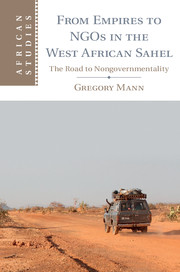Book contents
- Frontmatter
- Contents
- List of Maps and Figures
- Acknowledgments
- Maps
- Note on Terminology
- Introduction
- Part I
- Part II
- Introduction to Part II: Sahelian Migrations and State Thought
- 3 “French” Muslims in Sudan
- 4 Well-Known Strangers: How West Africans Became Foreigners in Postimperial France
- Part III
- Works Cited
- Index
Introduction to Part II: Sahelian Migrations and State Thought
Published online by Cambridge University Press: 05 January 2015
- Frontmatter
- Contents
- List of Maps and Figures
- Acknowledgments
- Maps
- Note on Terminology
- Introduction
- Part I
- Part II
- Introduction to Part II: Sahelian Migrations and State Thought
- 3 “French” Muslims in Sudan
- 4 Well-Known Strangers: How West Africans Became Foreigners in Postimperial France
- Part III
- Works Cited
- Index
Summary
Sahelian Migrations and State Thought
In a classic essay on “Immigration and State Thought” Abdelmalak Sayad argued that the way one thinks about immigration is a product of state thought – that is, “thought that reflects the structure of the state” – and that “thinking about immigration means thinking about the state [for] … it is ‘the state that is thinking about itself when it thinks about immigration.’” Sayad added that, “It is in the very nature of the state to discriminate, and, in order to do so, to [distinguish] between the ‘nationals’ it recognizes as such and in which it therefore recognizes itself … and ‘others’ with whom it deals only in ‘material’ or instrumental terms.” Sayad was a sociologist, not an historian. Empire was the precondition, not the subject, of his studies of Algerian migration to France, and his vision of the state was a normative one. Yet taking off from Sayad’s insight, the pair of chapters that follow examine the recomposition of forms of political identity in turbulent times, such as at the dissolution of empires and the establishment of African independence. They understand the state as an unfinished project, as an entity coming into being. Here we profit from what Sayad termed immigration’s “secret virtue”: it offers “an introduction, and perhaps the best introduction of all, to the sociology of the state.”
- Type
- Chapter
- Information
- From Empires to NGOs in the West African SahelThe Road to Nongovernmentality, pp. 89 - 92Publisher: Cambridge University PressPrint publication year: 2014

